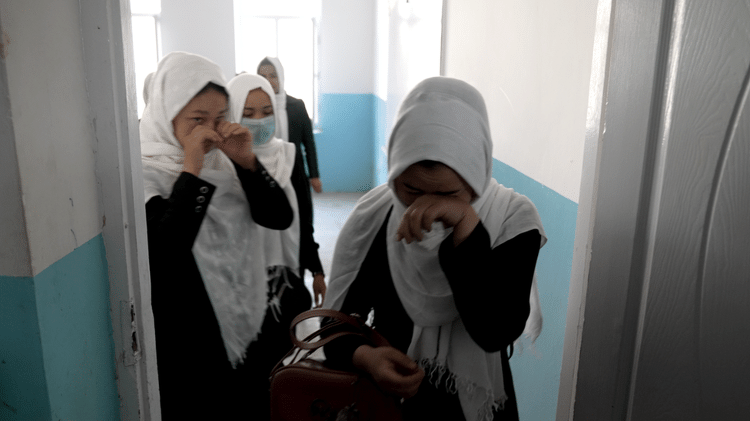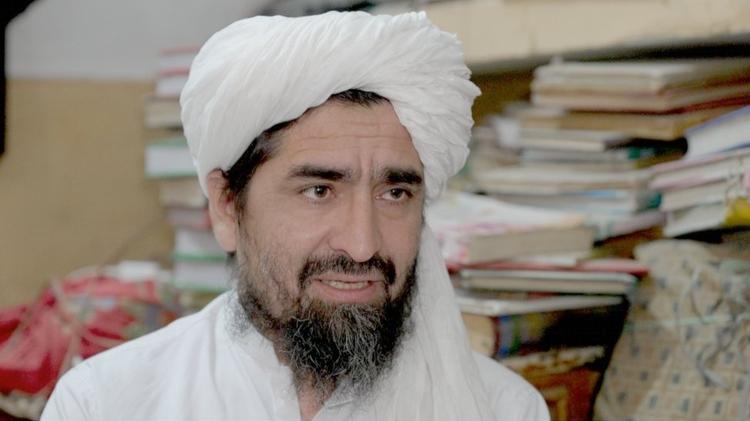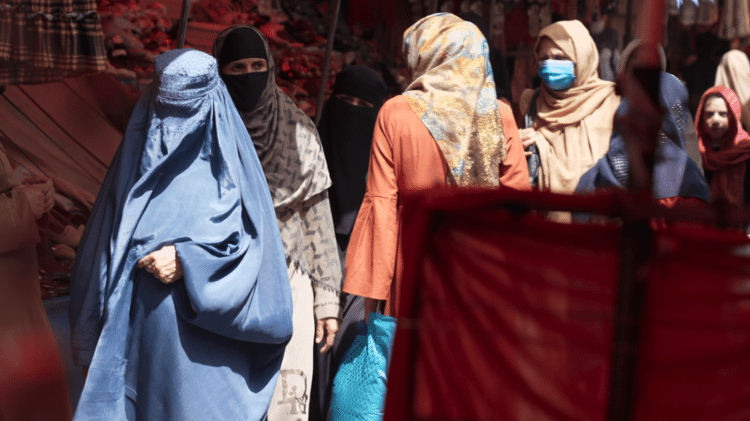Classes are a minor act of resistance after the Taliban deprived most youth of their right to education.
One of Afghanistan’s new “secret” schools is a small but powerful act of resistance against the Taliban, hidden in a residential area.
About a dozen young girls attend a math class.
“We are aware of the threats and are concerned about them,” said the only teacher, adding that girls’ education is “worth any risk.”
- Afghans have reported cases of disappearance and ‘incarceration’ in their own homes under Taliban rule.
- Secret diaries of Afghan women after the Taliban came to power
In almost every province in the country, girls’ secondary schools have been ordered by the Taliban to remain closed.
At the school we visited, impressive work was done in an attempt to recreate a traditional classroom with rows of blue and white rows.
“We do our best to do it secretly,” says the teacher, “but it’s worth it even if they arrest me, beat me.”
It looked like girls’ schools would reopen in March. But about an hour after the students started arriving, the Taliban leadership announced a sudden change in policy.
For the students of the secret school and many other young people, the pain is still intense.
“It’s been two months and schools still haven’t reopened,” says a 19-year-old girl in a makeshift classroom.
“This really upsets me,” she added, covering her face with her palms to hold back the tears.
But there is also a climate of resistance.
Another 15-year-old student says she wants to send a message to other girls in Afghanistan: “Be brave, if you’re brave, no one can stop you.”
Girls’ primary schools reopened during the Taliban era – and indeed, there was a surge in school attendance following increased security in rural areas of the country. But it’s unclear when older girls will be able to return to school.
The Taliban said that although schools are already gender-segregated, the right “Islamic environment” must be created first, so no one is sure what that really means.
Taliban officials have repeatedly insisted publicly that schools for girls would be reopened, but they also acknowledged that women’s education is a “sensitive” issue for them.
During the Taliban’s previous rise to power in the 1990s, all girls were barred from school, ostensibly due to “security concerns”.
Now, several sources have told the BBC that a handful of tough but highly influential people in the group still oppose it.
Other Taliban members, in particular, expressed their disappointment at the decision not to open schools for girls.
When the leadership foiled their plans in March and some top Taliban officials were said to be training their daughters in Qatar or Pakistan, the Taliban Education Ministry seemed as surprised as anyone.
‘No reason’
In recent weeks, several Taliban-linked religious scholars have issued statements fatwasor religious decrees that support girls’ right to learn.
Sheikh Rahimullah Haqqani is an Afghan cleric based largely across the border in Peshawar, Pakistan. He is highly respected by the Taliban and met key figures in the regime during his visit to Kabul last month.
He is careful not to criticize the ongoing school closures, but scrolls through the text of his letter while talking on his cell phone at his madrasa (Islamic school) in Peshawar. fatwaSharing judgments from previous scholars and accounts of Muhammad’s life.
“There is no justification in Sharia” [lei islâmica] to say that women’s education is not allowed. There is no justification,” he told the BBC.
“All religious books say that women’s education is permissible and compulsory, because in an Islamic environment such as Afghanistan or Pakistan, if a woman gets sick and needs treatment, it is much better to be treated by a female doctor.”
fatwas similar ones were published by the clergy in Afghanistan’s Herat and Paktia provinces. This is now a symbol of widespread support for girls’ education in the country, even among conservative circles, but it is unclear what impact the decrees will have.
The Taliban set up a committee to look into the matter, but several Taliban sources told the BBC that even Taliban ministers agreed to reopen girls’ schools in March, with opposition centered on the group’s leadership in Kandahar city. , where the religious leader Mullah Haybatullah is based.
The Taliban, which initially took a more flexible stance on taking power last August, has recently issued increasingly stringent decrees, including making the veil mandatory for women and encouraging them to stay at home.
Meanwhile, their tolerance for dissent, even within their own hierarchies, is waning.
A Taliban member with a large following on social media tweeted criticizing new rules that order girls’ schools to be closed and government officials to grow beards.
But according to a source, he was summoned for questioning by the Taliban intelligence department, who later deleted the tweets and apologized for his comments about wearing a beard.
There appears to be little popular opposition to girls’ education in Afghanistan, but some Taliban figures have expressed concerns that the extremist group calling itself the Islamic State will use the issue as a recruitment tool if schools for girls are opened.
But Western officials also made it clear that advancing women’s rights is critical if the Taliban are to gain access to some of their frozen billions of dollars in foreign exchange reserves.
Meanwhile, Afghan women’s rights activists are trying to ensure that a generation of girls is not left behind.
At the secret school we visited, they teach math, biology, chemistry, and physics for an hour or two a day.
The responsible teacher knows that there are many other girls who want to participate, but there is a limitation due to the lack of space and resources, as well as the need to stay under the radar.
He is not optimistic about the opening of regular schools anytime soon, but he is determined to do his best.
“As an educated woman, it’s my duty,” she tells the BBC.
“Education can save us from this darkness.”
Did you know that the BBC is also on Telegram? subscribe to the channel.
Have you watched our new videos on YouTube?? Subscribe to our channel!
source: Noticias


